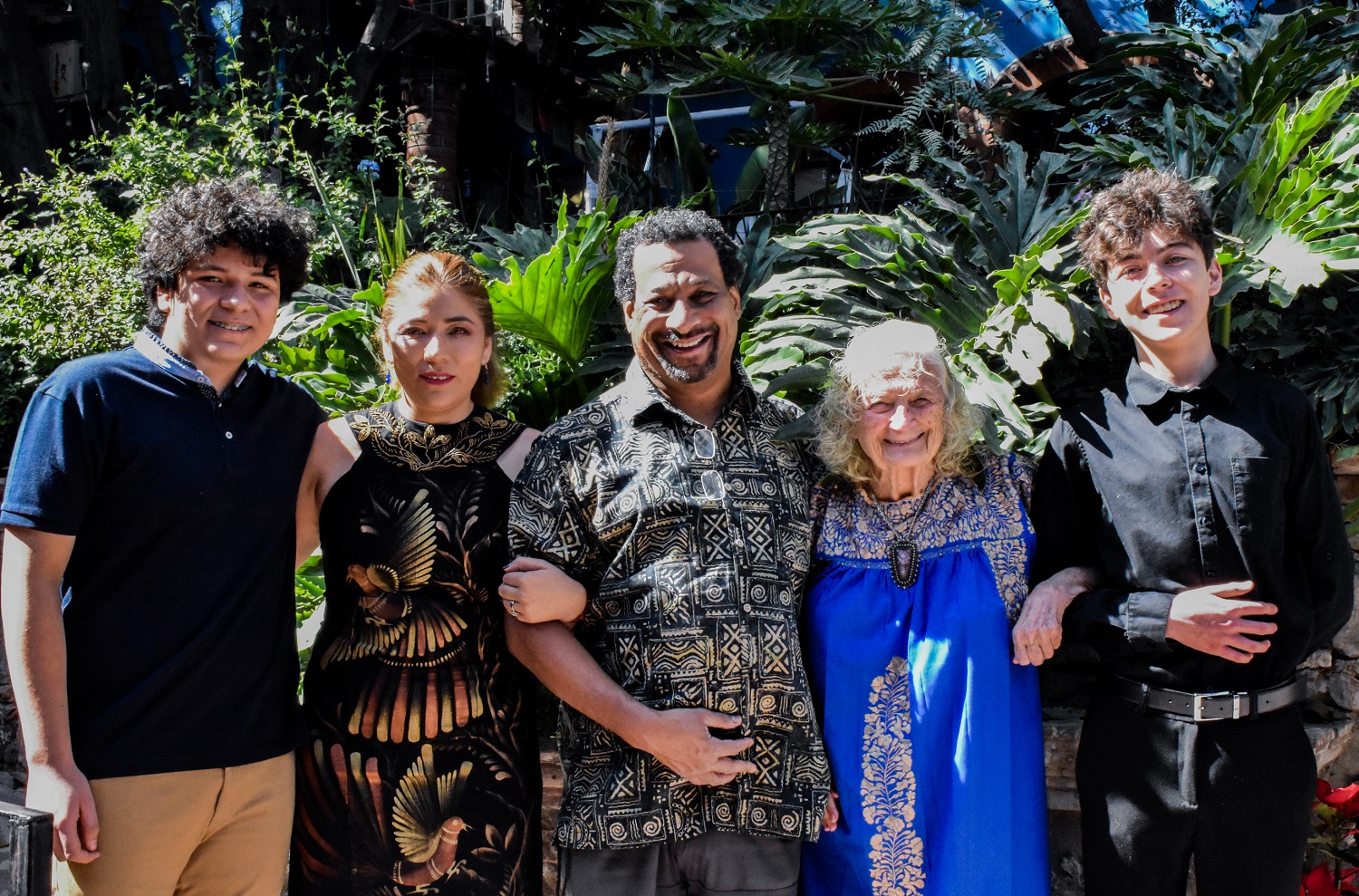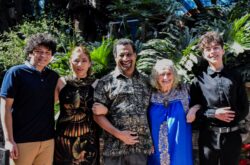Gwendolyn Midlo Hall and the Future of Louisiana Studies
Looking at the career of an influential scholar
Published: February 27, 2021
Last Updated: June 14, 2021

Gwendolyn Midlo Hall, second from right, with her son Haywood Hall, daughter-in-law Blanca Otero, and grandsons Ruben (far right) and Hector (far left).
Ibrahima Seck, the Senegalese scholar and Director of Research at Whitney Plantation, remembers the first time he heard Gwendolyn Midlo Hall speak.
Ibrahima Seck, the Senegalese scholar and Director of Research at Whitney Plantation, remembers the first time he heard Gwendolyn Midlo Hall speak. He was a high school teacher in Senegal at the time, and she was speaking at the opening of the West African Research Center in Dakar: “It was the first time I heard such a limpid discourse about the African Diaspora. As an African, being from a specific region she was discussing, I could understand the deepness and correctness of her work. It resonated in my mind. I could recognize myself.” That’s a challenge only the greatest historians answer—telling a story about history that is so true and so correct that people in the present see themselves reflected, perceived, and understood. But it’s a challenge Hall, the 2020 recipient of the Center for Louisiana Studies at the University of Louisiana at Lafayette’s James William Rivers Prize in Louisiana Studies, has answered time and again in her work.
Born in Louisiana in 1929 to Ethel and Herman L. Midlo, a pioneering power couple of Louisiana civil rights, Hall has also been recognized for her work as an activist and organizer on behalf of human rights. As a young teenager in the 1940s, she was already agitating against Jim Crow and working to register African American voters as part of the New Orleans Youth Council. Hall’s lifelong endeavors in civil rights would have filled a full career, but what’s even more remarkable is that she pursed them while building an incredible legacy as an academic and public intellectual in a male-dominated field. She obtained her PhD in Latin American history at the University of Michigan while raising three children while also being harried and actively blacklisted by the FBI, like many other great public intellectuals of her generation, for her advocacy.
Among the most striking characteristics of Hall’s best-known work is how closely it hews to meticulous primary research, how devoid of jargon it is, how “limpid,” to use Ibrahima Seck’s term. Hall herself once noted her own “growing confidence in the concrete and distrust of the abstract, [and] lack of deference to changing fads in methodology and interpretation.” What one finds in Hall’s seminal books, Africans in Colonial Louisiana: The Development of Afro-Creole Culture in the Eighteenth Century (LSU Press, 1992) and Slavery and African Ethnicities in the Americas: Restoring the Links (University of North Carolina Press, 2007), is not gauzy, jargon-filled ideological posturing about race, but is sinewy and accessible yet deeply erudite empirical work that builds insight upon insight into an intellectual vision of Louisiana history that students and scholars of Louisiana are really only starting to truly reckon with.
Ibrahima Seck elaborated, “What she discovered was a very humanized history of slavery and Louisiana culture. People aren’t shadows in her work. They are people.” Hall’s advances remain striking and even counterintuitive, essentially inverting much of what previous historians assumed (and what most people still assume) about Louisiana history and culture. Though many imagined that African culture in Louisiana was erased by slavery, or that it was largely an import from Haiti, her painstaking work in the archives of Pointe Coupée Parish and elsewhere indicated that a distinct Afro-Creole culture had already coalesced in the colonial crucibles of the early eighteenth century. By 1750, for instance, Afro-Creoles and others were already speaking the creolized Afro-Creole French still spoken in parts of Louisiana today. She also made a compelling case—again, using rigorous quantitative research—for the continuity of diverse African ethnicities from distinct regions and from distinct tribes, and she left breadcrumbs for future scholars through the creation of Afro-Louisiana History and Genealogy, 1719–1729, a digital database initially issued on CD-ROM. Along the way, this work confirmed her role as a pioneer of the digital humanities and of public history. Just as importantly, she used the data she compiled to indicate how deeply African early Louisiana was and continued to be—and how deeply plural, a multi-ethnic cultural maelstrom that inaugurated a new world culture.
“What she discovered was a very humanized history of slavery and Louisiana culture. People aren’t shadows in her work. They are people.”
Hall reoriented the way scholars today look at Louisiana, and her work ripples through a host of fields, including folklore studies, ethnomusicology, colonial American history, the history of the US South, and the history of slavery and the African Diaspora, just to name a few.
“While Dr. Hall is particularly well known for her contributions to tracing the African backgrounds and life stories of enslaved Africans and African Americans in Louisiana, she was even more widely a critical voice in transformations which occurred in the study of Black enslavement all around the hemisphere,” explained Tulane history professor Dr. Rosanne Adderley. “Thinking transnationally about slavery rather than with only state or national focuses, thinking in detail about the African backgrounds of people enslaved, thinking about creative ways to use technology and archives to better understand the lives of ordinary Black people—these things are now hallmarks of the study of early Black life in Louisiana, North America, and around the region. Dr. Hall is one of the key authors of this transformation in how we study those fields.”
Dr. Michael Martin, managing editor of the Journal of Louisiana History and a history professor at the University of Louisiana at Lafayette, added, “Her books stand among the few examples of work on Louisiana and American history that revolutionized historians’ understanding of our past. Most historians hope to have a profound effect on their profession. Few actually do. Gwendolyn Midlo Hall has.”
Three decades after Hall’s groundbreaking Africans in Colonial Louisiana, what’s striking is not only how visionary it was, but also how far we have yet to go in Louisiana to integrate the key insights she offered about our past and our present. People still think Cajuns created gumbo. People still think mostly in binary terms about race in Louisiana. But as Hall herself said in an interview for Callaloo magazine in the aftermath of Hurricane Katrina, speaking of Louisiana culture and New Orleans in particular, “It’s one of the few examples, maybe the greatest example, of a universalist culture that’s grown up through great diversity and mutual borrowing among people. In that sense, it’s the future.”
To learn more about Gwendolyn Midlo Hall, pick up a copy of her latest book, Haunted by Slavery: A Memoir of a Southern White Woman in the Freedom Struggle, published March 1 by Haymarket Books.
